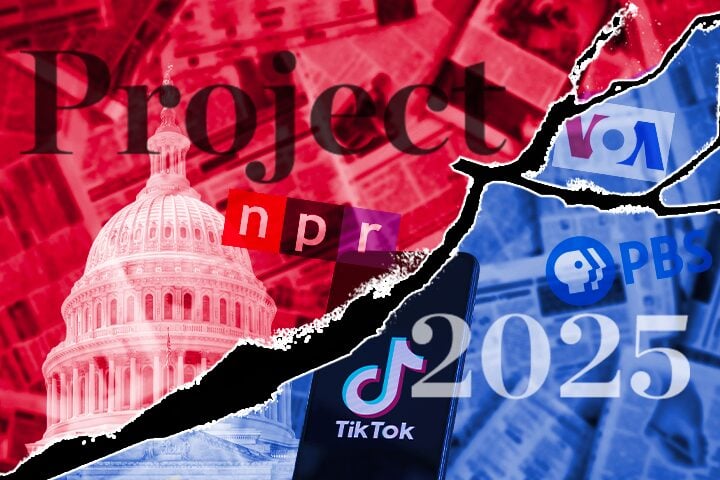Project 2025
Policy Proposal Poses Threats to Freedom of Expression at Home and Abroad

What is Project 2025?
Project 2025 is a set of policy proposals from the Heritage Foundation–a think-tank that describes its mission as building and supporting conservative public policies. The centerpiece of Project 2025 is its “Mandate for Leadership”, a 922-page set of policy proposals that represents a wish list of policies that it hopes the next conservative Presidential Administration – whoever the candidate – will implement, beginning immediately upon assuming office. Developed primarily by Heritage Foundation staff and consultants, Project 2025’s proposals have also been endorsed by approximately 100 other conservative think-tanks.
Project 2025 repeatedly and explicitly positions itself as a pro-free speech document–pushing back against government, corporate, and ‘elite’ intrusion into speech at universities, on social media, and amongst people of faith. But many of the policies it puts forth are in fact unabashedly hostile to free speech and the free flow of information, as PEN America will explain.
This is the second of a two-part series analyzing Project 2025 and the threat its ideas – which have significant traction well beyond any single white paper – pose to freedom of expression in the United States. See the first part of our analysis here.
Recently, PEN America published an analysis of how Project 2025 seeks to turbocharge book banning and similar attacks on the freedom to read, learn, and teach, as part of an envisioned overhaul of the public education system in the United States. That analysis–4 Key Threats Project 2025 Would Pose to the Freedom to Read, Learn, and Teach–can be read here.
But that is only one set of proposals that Project 2025 advances–and many of its other proposals would similarly damage freedom of speech, freedom of the press, and related freedoms. If enacted, even in part, Project 2025 would cause damage in ways that affect both the United States’ domestic policies and foreign affairs.
So here are Three More Key Threats Project 2025 Poses to Freedom of Expression, at Home and Abroad.
1. Project 2025 Proposes Explicit Censorship of Concepts and Language in Federal Rules
We start this list with one of the more shocking proposals PEN America has ever seen: explicit censorship of every federal governing document, removing key words and concepts, in order to meet an ideological litmus test set by the Heritage Foundation.
In the Foreword to Project 2025, the president of the Heritage Foundation, Kevin Roberts, writes: “The next conservative President must make the institutions of American civil society hard targets for woke culture warriors. This starts with deleting the terms sexual orientation and gender identity (“SOGI”), diversity, equity, and inclusion (“DEI”), gender, gender equality, gender equity, gender awareness, gender-sensitive, abortion, reproductive health, reproductive rights, and any other term used to deprive Americans of their First Amendment rights out of every federal rule, agency regulation, contract, grant, regulation, and piece of legislation that exists.”
Project 2025 provides a hit list of forbidden terms–even the term “gender” is not safe. And this list is not final: The inclusion of the phrase, “and any other term used to deprive Americans of their First Amendment rights” makes it clear that the architects of Project 2025 intend to expand their list of censored terms in the future.
The idea that these or other words are used to deprive Americans of their rights is a red herring. Yet as astonishing as it sounds, Project 2025’s plan is to have the U.S. government censor specific words in the name of “protecting” free speech. It would impose this censorship throughout a wide swath of government documents which would, in turn, have dramatic effects on the work of government and the American people, as well as those around the world touched by U.S. policy and programs.
There is no act of censorship that is more explicit than literally banning words. But that is precisely what Project 2025 proposes: prohibiting the use of terms and concepts that its authors find ideologically objectionable and deleting them from every government document where they are already used. This is what the forced imposition of ideological conformity over all Americans would look like.
This proposal is more than just wordsmithing. Ask yourself: How will this affect foreign aid programs dealing with life-or-death issues–like AIDS prevention or infant mortality–if U.S. government personnel cannot even put the word “gender” in their contracts with service providers? How will it affect health services here in the United States, if health professionals or researchers must navigate a minefield of forbidden terms in order to access federal aid? How will it affect education programs, if federal regulations no longer even mention “diversity” or “gender”? How will it affect artists, writers, and cultural institutions seeking support from the NEA, NEH, or IMLS, or scholars and universities seeking federal funding from the NSF, NIH, or other federal agencies, if they are incentivized to censor their proposals and their artistic and academic work?
Project 2025’s defenders may attempt to pass this proposal off as mere rhetoric. But there is a specific list of terms that Project 2025 proposes be removed from an equally specific list of federal documents that would have significant impacts on public policy and the work of the U.S. government. In short, this is as concrete a policy proposal as any other in the document. Its sweeping scope and specificity outline a clear plan to censor not only government documents, but the way in which legislation, regulations, and policy are made in the United States.
2. Project 2025 Seeks to Transform US-Funded Media Outlets into Propaganda Outlets–Or Simply Shut Them Down–and Defund the Corporation for Public Broadcasting
If all of that was not enough, in Chapter Eight, Project 2025 proposes either a complete gutting of the editorial independence of federally supported media outlets via the US Agency for Global Media (USAGM)–or the elimination of the agency altogether–and, domestically, it proposes cutting all funding for the Corporation for Public Broadcasting (CPB).
This would directly affect USAGM-affiliated outlets such as Radio Free Asia, Radio Free Europe/Radio Liberty, and Voice of America. In addition, they seek to gut the independent Open Technology Fund, which fights digital surveillance and internet censorship, and the Corporation for Public Broadcasting, which supports independent local media, if they are not “reformed” to represent Project 2025’s approved ideological slant which would, among other things, prevent criticism of US government policies or political figures.
The USAGM’s outlets are long-standing pillars of U.S. international broadcasting – Voice of America is the oldest U.S. international news broadcaster, dating back to 1942. Organizations like Voice of America, Radio Free Asia, and Radio Free Europe/Radio Liberty put out factual, uncensored news reporting on events in some of the world’s most authoritarian and highly-censored countries–in the native languages of those countries’ people.
These entities have been made more independent from potential government influence over the years, and today they focus particularly on providing accurate, uncensored information to people in countries suffering under dictatorship and repression – on Voice of America’s website, for example, Iran and China are highlighted as two of its major coverage zones. Radio Free Asia, another such outlet, acts to provide uncensored reporting to communities in places like Myanmar, Cambodia, and China–including with dedicated reporting for ethnic minorities such as Uyghurs and Tibetans. The outlets have broad reach. Voice of America, for example, broadcasts in 48 languages and reaches a weekly audience of 326 million people worldwide. For millions, they provide a lifeline to the outside world, and to information that is suppressed and censored in their own countries.
But for Project 2025, these outlets must be “fully reformed top to bottom,” or scrapped entirely. We’ve seen similar efforts in the past to “reform” the USAGM–by stripping it and its affiliated outlets of their editorial independence and transforming them into blatantly partisan cheerleaders for the Administration. PEN America was vocal during that time to warn against these highly inappropriate efforts. If Project 2025’s proposals go into effect, those attempts will have been just a prelude.
Project 2025’s proposals for “reform” fundamentally fly in the face of widely accepted journalistic norms and longstanding precedent. The proposals advocate for “reform” (effectively, elimination) of the fundamental journalistic principle of a “firewall” between editors, who make decisions about news media content, and front office business managers and administrators, who typically manage the business aspects of a media outlet and deliberately stay out of such decisions to ensure journalistic independence. As a justification for why such firewalls should be removed, on page 239, Project 2025 states: “VOA’s White House correspondent was posting content highly critical of, and personally insulting to, the U.S. President.”
Project 2025 goes on to say that “[The USAGM’s] shortfalls are either oriented toward, or directly contribute to, the agency’s media organizations joining the mainstream media’s anti-U.S. chorus and denigrating the American story—all in the name of so-called journalistic independence. Indeed, content during the Trump Administration was rife with typical mainstream media talking points assailing the President and his staff.”
Essentially, Project 2025 justifies its proposal to dismantle the USAGM by describing it as an institution that “parrots America’s adversaries’ propaganda and talking points,” before going on to describe its own proposal to turn USAGM’s outlets into the next conservative administration’s own propaganda machine. Rhetoric demonizing the “mainstream media” also indicates an obvious ideological swing at independent journalistic standards. The resulting attempt to transform these institutions into government mouthpieces is deeply worrying, in that it clearly aims to dismantle core tenets of a free press.
Today, agencies like Radio Free Asia and Radio Free Europe/Radio Liberty are often staffed by, among others, exiled writers and dissident voices from the region–people who have paid a high price for speaking truth to power. VoA is also important to diasporic communities in the U.S., who often turn to it as a source of reliable reporting on their home countries, where censorship might be rampant. By stripping these institutions of their journalistic integrity, the drafters of Project 2025 are explicitly deprioritizing and stifling access to global news, perspectives, and voices. At its core, access to credible, accurate information that is independent of any particular government administration helps to empower civic engagement and strengthen democratic principles, even in repressive environments. Gutting and politicizing the USAGM, as Project 2025 suggests, is another example of the ways in which its drafters seek to undermine American commitments to democracy, transparency, and a free press.
This same attitude is on display with Project 2025’s attempt to defund the Open Technology Fund, a nonprofit operating under the USAGM. The OTF was initially born as a pilot program within RFA. Today, it is an independent corporation which engages, supports, and spearheads the development of technologies to counter digital surveillance and internet censorship. The OTF works directly on human rights protection through the avenue of technology, and addressing an area of rapidly-increasing necessity in terms of global human rights advocacy. Project 2025, meanwhile, refers to it as a “wasteful and redundant boondoggle.”
As mentioned, Project 2025 also proposes to completely defund the Corporation for Public Broadcasting (CPB), which would, among other things, do away with the funding CPB currently provides to PBS and NPR. The policy document recycles a frequently used but misguided talking point that the federal broadcaster and the outlets it supports are “leftist” organizations. PEN America has been vocal that the United States needs more public funding to support local journalism, not less. We first examined the decimation of local news and its impact on democracy in our 2019 report Losing the News. For that report, we sat down with journalists, media experts, and policy wonks across the country to discuss how to resuscitate local news outlets, which serve an invaluable role in local communities to hold the government accountable, provide vital information, and encourage civic engagement. We concluded that a critical component of solving the local news crisis would be a significant new investment of public funding – not its elimination. De-funding the CPB would be a big step backward, exacerbating the problems that communities face when they do not have access to reliable local information.
3. Project 2025 Wants to Ban a Speech Platform Used by Nearly One-Third of All Americans
Project 2025 calls on the next Presidential administration to ban TikTok on the basis of national security concerns. But today, the social media app is used by an estimated 120 million Americans–or over one-third of the US population.
Notably, this policy prescription may be more likely to happen under a Democratic administration. President Biden already signed the law to force the sale or ban of TikTok by 2025 and former President Trump recently recanted his previous opposition to the app.
PEN America has previously stated that “banning TikTok establishes an alarming precedent” for government control over social media platforms and “is a vast overreach.” Not only does the new law force the sale of TikTok or order its closure in the US, it also provides the President of the United States the ability to order the sale or closure of other internet platforms if he or she, unilaterally, deems a foreign-owned platform a threat to national security. This is a grave threat to the free circulation of information and ideas online.
In April, PEN America signed on to a letter from two dozen civil rights organizations declaring that a TikTok ban would be “censorship–plain and simple.” Courts have already clearly signaled that such a ban is likely to be unconstitutional.
This is not to dismiss the legitimate privacy and security concerns that critics of TikTok have raised. But there are other ways to protect Americans’ data–such as comprehensive digital privacy legislation–that do not require the violation of our First Amendment rights.
Again, for a document that explicitly frames itself as protecting freedom of speech, Project 2025 seems to have no hesitation in stripping millions of Americans of the right to access information and express themselves on their social media app of choice.
In sum, Project 2025’s proposals could create a world in which government censors dominate and government propaganda reigns. If adopted, the policy proposals would impose new controls on how people communicate and share and receive information, including by unilaterally banning a widely used social media platform; transforming international media outlets that offer access to credible information for millions of people into just another government mouthpiece;; and even prohibiting specific words from use in any governing document, with untold consequences for the work of government, the American people, and those touched by U.S. policies and programs abroad. Project 2025’s proposals are a frontal assault on free expression and access to information – key components of democracy and core American values.
PEN America is a nonpartisan nonprofit organization. Our educational and advocacy work defending free expression has long focused on laws and policy proposals that threaten free speech and undermine crucial First Amendment protections.


